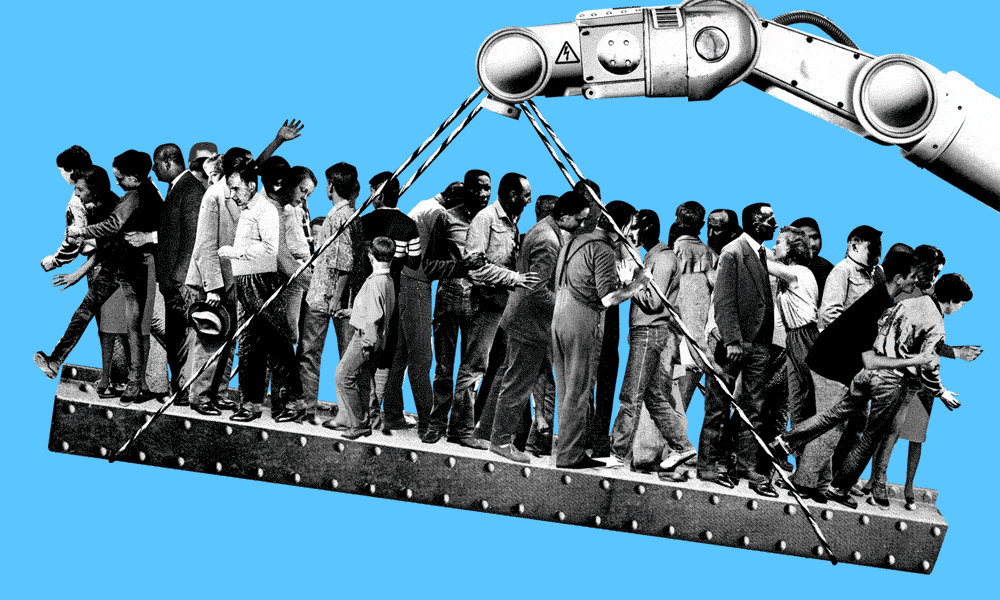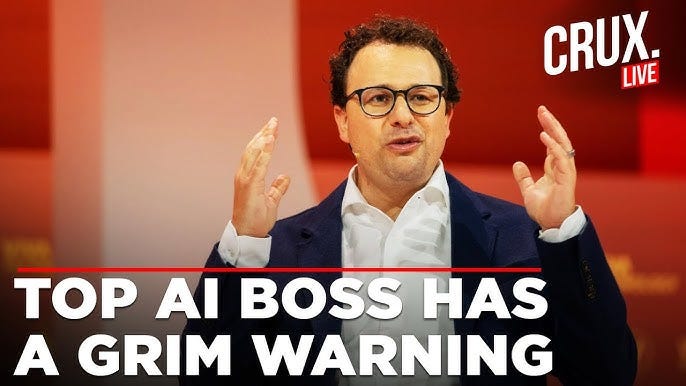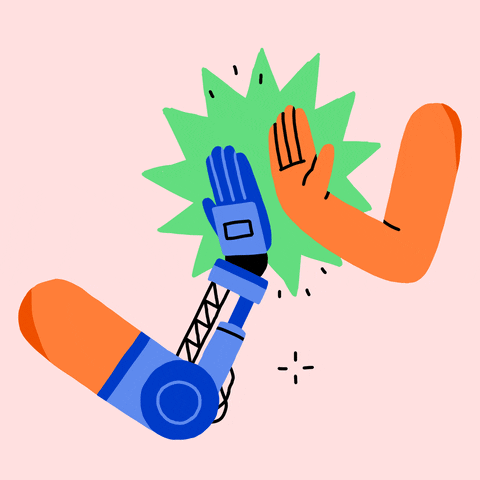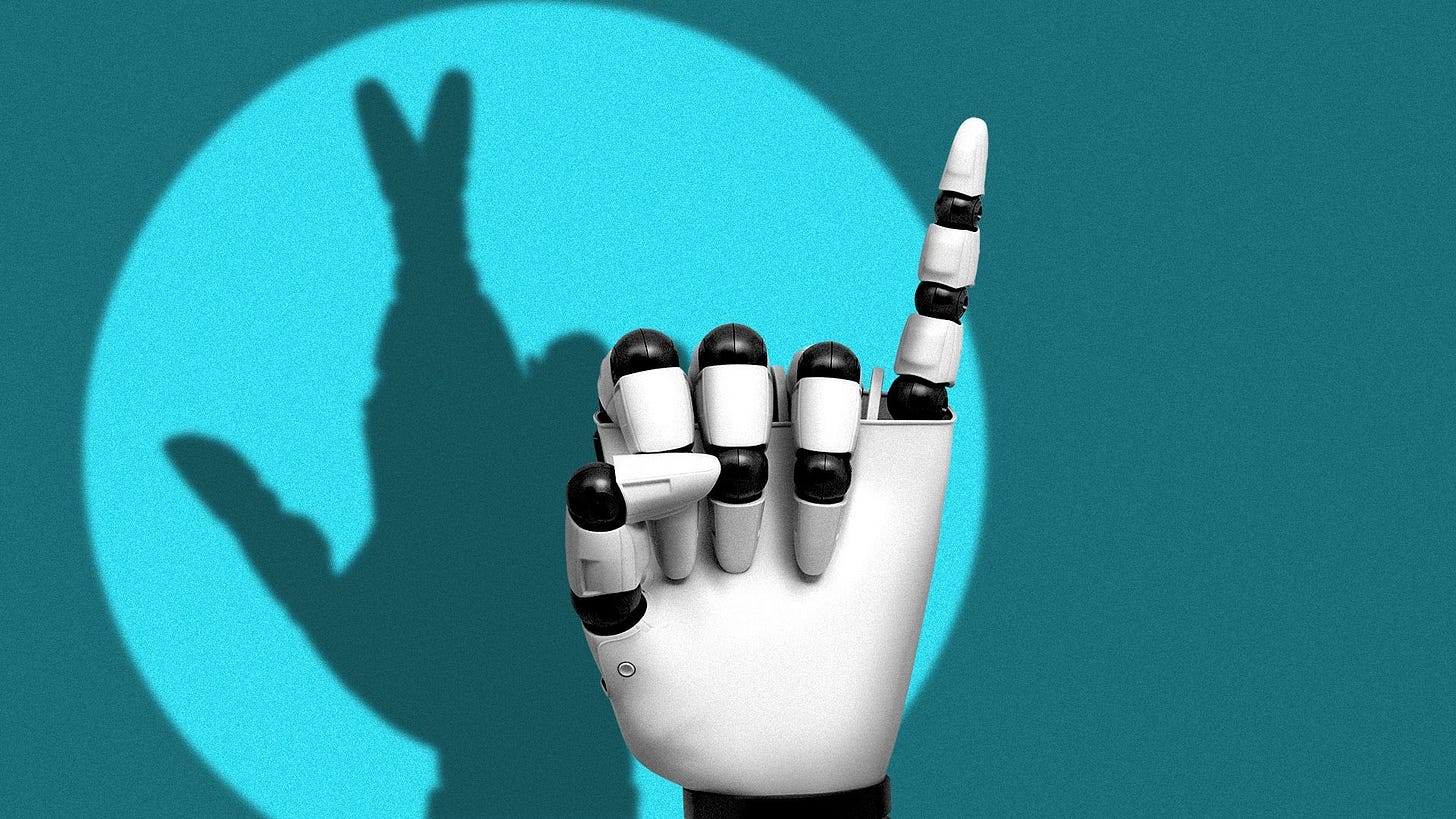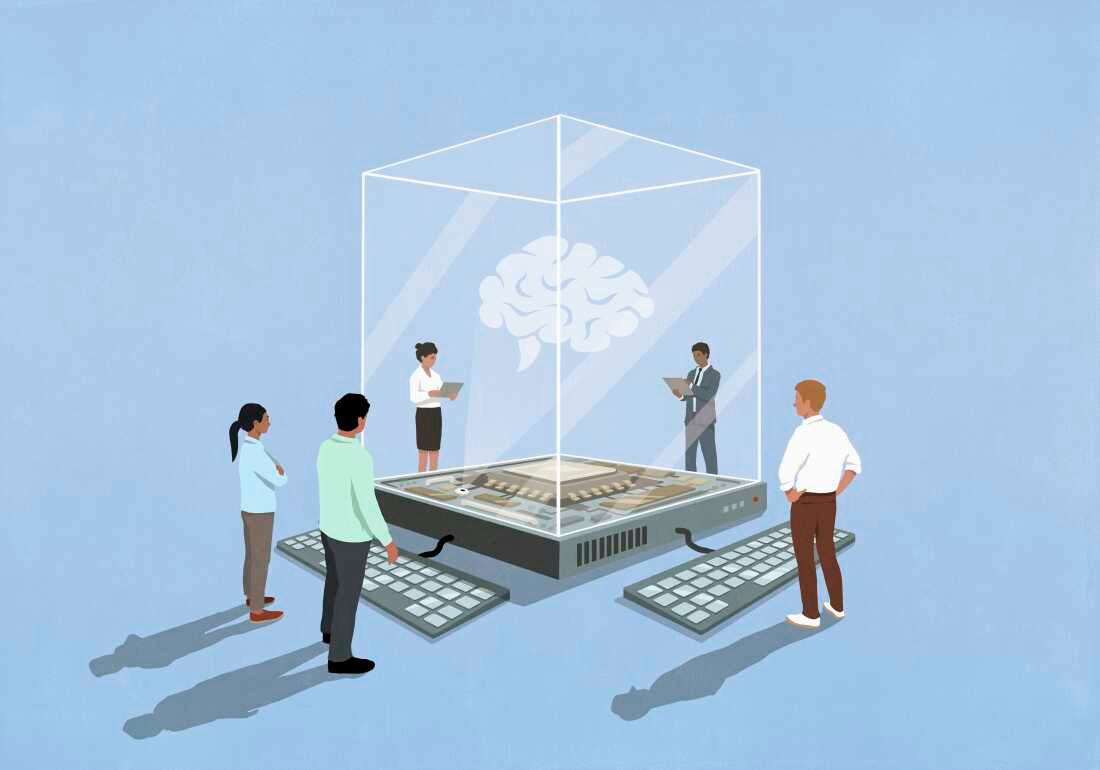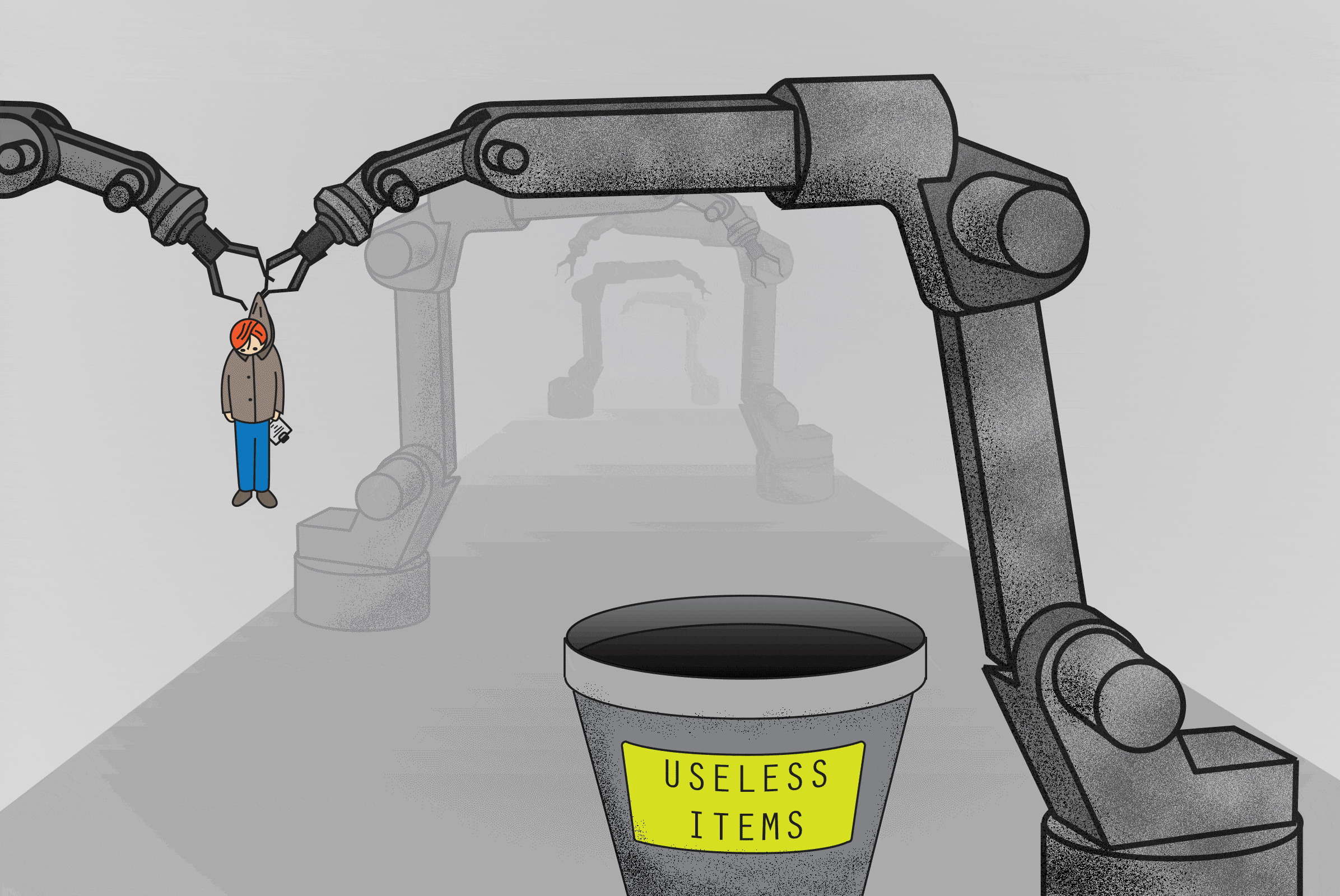
AI: AI Jobs Fears Rise Again. RTZ #738
From the earliest days of this AI Tech Wave, a core fear in the market has been the impact on jobs globally. Across vertical markets, be they white or blue collar. One of the surprising outcomes thus far has been the counter-intuitive impact on white collar jobs vs blue collar jobs.
All this despite evidence across various technology waves for centuries that tech change and innovations generally create MORE jobs and opportunities on a net basis. Over time.
Economists even have a term for its, Jevons Paradox. Discussed in these pages here not too long ago.
The issue came up again last week driven by statements by the founder/CEO of Anthropic Dario Amodei no less on the subject. Especially on white collar jobs impact
Axios summarizes them in “Behind the Curtain: A white-collar bloodbath”:
“Dario Amodei — CEO of Anthropic, one of the world’s most powerful creators of artificial intelligence — has a blunt, scary warning for the U.S. government and all of us:”
“AI could wipe out half of all entry-level white-collar jobs — and spike unemployment to 10-20% in the next one to five years, Amodei told us in an interview from his San Francisco office.”
“Amodei said AI companies and government need to stop “sugar-coating” what’s coming: the possible mass elimination of jobs across technology, finance, law, consulting and other white-collar professions, especially entry-level gigs.”
Stated motives apparently were to give the market more time to prepare. Potentially to curtaiil the relatively unbounded enthusiasm to experiment with AI:
“Why it matters: Amodei, 42, who’s building the very technology he predicts could reorder society overnight, said he’s speaking out in hopes of jarring government and fellow AI companies into preparing — and protecting — the nation.”
“Few are paying attention. Lawmakers don’t get it or don’t believe it. CEOs are afraid to talk about it. Many workers won’t realize the risks posed by the possible job apocalypse — until after it hits.”
“Most of them are unaware that this is about to happen,” Amodei told us. “It sounds crazy, and people just don’t believe it.”
The government top down has also been leaning away from AI job risk fears of late:
“The big picture: President Trump has been quiet on the job risks from AI. But Steve Bannon — a top official in Trump’s first term, whose “War Room” is one of the most powerful MAGA podcasts — says AI job-killing, which gets virtually no attention now, will be a major issue in the 2028 presidential campaign.”
“”I don’t think anyone is taking into consideration how administrative, managerial and tech jobs for people under 30 — entry-level jobs that are so important in your 20s — are going to be eviscerated,” Bannon told us.”’
Meanwhile, Anthropic has been on its own pace of innovation around LLM AIs with its Claude products, as well as AI Reasoning and Agentic capabilities:
“Amodei — who had just rolled out the latest versions of his own AI, which can code at near-human levels — said the technology holds unimaginable possibilities to unleash mass good and bad at scale:”
“Cancer is cured, the economy grows at 10% a year, the budget is balanced — and 20% of people don’t have jobs.” That’s one very possible scenario rattling in his mind as AI power expands exponentially.”
“The backstory: Amodei agreed to go on the record with a deep concern that other leading AI executives have told us privately. Even those who are optimistic AI will unleash unthinkable cures and unimaginable economic growth fear dangerous short-term pain — and a possible job bloodbath during Trump’s term.”
“We, as the producers of this technology, have a duty and an obligation to be honest about what is coming,” Amodei told us. “I don’t think this is on people’s radar.”
“It’s a very strange set of dynamics,” he added, “where we’re saying: ‘You should be worried about where the technology we’re building is going.'” Critics reply: “We don’t believe you. You’re just hyping it up.” He says the skeptics should ask themselves: “Well, what if they’re right?”
And the concurrent bullish/bearish tones have been confusing for many, complicating the net likelihood that AI automation AUGMENTS and AMPLIFIES human workers:
“An irony: Amodei detailed these grave fears to us after spending the day onstage touting the astonishing capabilities of his own technology to code and power other human-replacing AI products. With last week’s release of Claude 4, Anthropic’s latest chatbot, the company revealed that testing showed the model was capable of “extreme blackmail behavior” when given access to emails suggesting the model would soon be taken offline and replaced with a new AI system.”
In a separate piece, Axios went onto to provide new anecdotal data on AI jobs impacts, in “Ready or not, AI is starting to replace people”:
“Businesses are racing to replace people with AI, and they’re not waiting to first find out whether AI is up to the job.”
“Why it matters: CEOs are gambling that Silicon Valley will improve AI fast enough that they can rush cutbacks today without getting caught shorthanded tomorrow.”
“While AI tools can often enhance office workers’ productivity, in most cases they aren’t yet adept, independent or reliable enough to take their places.”
“But AI leaders say that’s imminent — any year now! — and CEOs are listening.”
“State of play: If these execs win their bets, they’ll have taken the lead in the great AI race they believe they’re competing in.”
“But if they lose and have to backtrack, as some companies already are doing, they’ll have needlessly kicked off a massive voluntary disruption that they will regret almost as much as their discarded employees do.”
Again, the concerns are amplified around white collar jobs:
“Driving the news: AI could wipe out half of all entry-level white-collar jobs — and spike unemployment to 10-20% in the next one to five years, Anthropic CEO Dario Amodei told Axios’ Jim VandeHei and Mike Allen this week.”
“Amodei argues the industry needs to stop “sugarcoating” this white-collar bloodbath — a mass elimination of jobs across technology, finance, law, consulting and other white-collar professions, especially entry-level gigs.”
And as stated earlier, Economists are urging taking a longer term view both on the anticipated negative and positive effects of AI:
“Yes, but: Many economists anticipate a less extreme impact. They point to previous waves of digital change, like the advent of the PC and the internet, that arrived with predictions of job-market devastation that didn’t pan out.”
“Other critics argue that AI leaders like Amodei have a vested interest in playing up the speed and size of AI’s impact to justify raising the enormous sums the technology requires to build.”
“By the numbers: Unemployment among recent college grads is growing faster than among other groups and presents one early warning sign of AI’s toll on the white-collar job market, according to a new study by Oxford Economics.”
“Looking at a three-month moving average, the jobless rate for those ages 22 to 27 with a bachelor’s degree was close to 6% in April, compared with just above 4% for the overall workforce.”
And there have been some notable retracements on premature pessimism:
“Between the lines: Several companies that made early high-profile announcements that they would replace legions of human workers with AI have already had to reverse course.”
“Klarna, the buy now, pay later company, set out in 2023 to be OpenAI’s “favorite guinea pig” for testing how far a firm could go at using AI to replace human workers — but earlier this month it backed off a bit, hiring additional support workers because customers want the option of talking to a real person.”
“IBM predicted in 2023 that it would soon be able to replace around 8,000 jobs with AI. Two years later, its CEO told the Wall Street Journal that so far the company has replaced a couple of hundred HR employees with AI — but increased hiring of software developers and salespeople.”
Again, the stress on the longer term time frames to get the truer picture, with more reliable backup data:
“Zoom out: Every modern era of technological transformation has disrupted the labor market, from the Industrial Revolution of the early 19th century to the assembly-line automation of the early 20th and the container ship-driven globalization of the millennium.”
This debate will most likely ebb and flow in this AI Tech Wave.
But it’s important to take both the bearish and bulish anecdotal signals and warnings, with a longer-term lump of salt. Stay tuned.
(NOTE: The discussions here are for information purposes only, and not meant as investment advice at any time. Thanks for joining us here)

